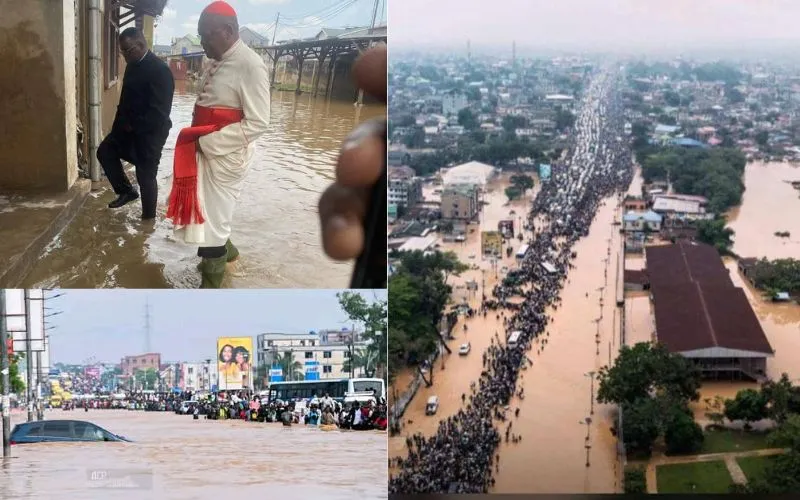He told ACI Africa that he has been working with young people in Plateau de Bateke in planting trees “and healing our land.”
“We believe in the sacred duty to care for our common home, Mother Earth as Pope Francis reminds us in Laudato Si’,” the MHM Priest said, referring to the May 2015 Encyclical Letter on care for our common home.
He added, “Together, the youth, Fr. Joseph Emeru and I have planted hundreds of trees, hoping to restore balance, reduce erosion, and protect future generations from ecological disasters. This is our humble response: faith in action, creation as vocation.”
Fr. Bolengu expressed solidarity with flood victims in Kinshasa, saying, “As a Priest, I look to Christ, who wept at the tomb of Lazarus. I too weep for the lost, for the broken, for the forgotten. I am afraid. I am grieving. And yet, I am not without hope. Because in the rubble, I still see hands reaching to help. I see youth cleaning drains. I see women sharing what little food they have. I see the Church rising, not only in prayer, but in service.”
He also appealed to people of goodwill to support those who have lost everything in the floods. He said, “To all people of good will within the Church and beyond I cry out: Kinshasa needs you. We need emergency support. We need clean water, medical care, and shelter. And we need your prayers.”
(Story continues below)
“Let us not turn away from this suffering. Let us not grow numb to the pain. Let us act now, with faith, with love, and with urgency,” Fr. Bolengu appealed in the April 9 interview with ACI Africa.
The flooding devastation finds DRC battling with a growing humanitarian crisis owing to the current incursion of the March 23 Movement (M23) rebels, who have made inroads into the Central African nation, with significant gains already made in the mineral-rich Eastern part.
Researchers at Denis Hurley Peace Institute (DHPI) of the Southern African Catholic Bishops’ Conference (SACBC) have warned that should the Rwanda-backed invasion continue, DRC risks a “complete breakdown”.
Amid the challenges, including seemingly never-ending armed conflicts in the poverty-stricken Plateaux de Bateke, Fr. Bolengu has expressed his commitment to be the voice of the voiceless.
“As I walk through this suffering, I feel both powerless and called to raise my voice for those who have none, and to weep with those who weep,” the MHM member told ACI Africa, and added, “Kinshasa is not just a city. It is a soul; wounded, fragile, and yearning for compassion.”
Agnes Aineah is a Kenyan journalist with a background in digital and newspaper reporting. She holds a Master of Arts in Digital Journalism from the Aga Khan University, Graduate School of Media and Communications and a Bachelor's Degree in Linguistics, Media and Communications from Kenya's Moi University. Agnes currently serves as a journalist for ACI Africa.








